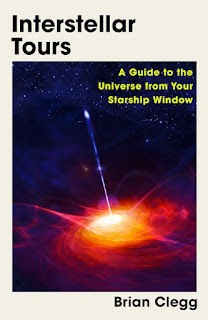Brian Clegg's Blog, page 17
November 27, 2023
Losing our culture
 My favourite comic strip of all time is The Perishers. Published in the Daily Mirror from the late 50s until 2006 it could be taken at first glance as something of a Peanuts rip-off. After all, it features only children and animals - and the central characters are a boy and his dog (whose thoughts are revealed to be very human-like). However, in reality the feel and the humour is totally different and entirely British. At its best, The Perishers is a total delight.
My favourite comic strip of all time is The Perishers. Published in the Daily Mirror from the late 50s until 2006 it could be taken at first glance as something of a Peanuts rip-off. After all, it features only children and animals - and the central characters are a boy and his dog (whose thoughts are revealed to be very human-like). However, in reality the feel and the humour is totally different and entirely British. At its best, The Perishers is a total delight.One of the strip's features is a series of running jokes, some of which carried on for decades. For example, on summer holiday excursions, the characters regularly take a look in a rock pool, where the crabs believe they are being visited by their equivalent of UFOs which they refer to as 'the eyes in the sky', often having failed protests or attempts to take on the invaders. Other continuing jokes are just small features that bring on a smile, one being the teddy belonging to Baby Grumpling, a cynical toddler who is generally out for what he can get (pictured above). The teddy is called Gladly.
And this is where the culture bit comes in - because my children's generation simply wouldn't get the joke behind that name. The key to it is that the teddy is cross-eyed. So, it is 'Gladly, my cross-eyed bear', a reference to a now obscure Victorian hymn called Keep Thou My Way, which includes the line 'Kept by thy tender care, gladly the cross I'll bear'. (Most people, me included until I looked for it, thought there was actually a hymn named 'Gladly my cross I'd bear'.) This was not by any means an original joke, but beautifully incorporated into the comic strip.
When my generation was growing up, hymns were familiar things. I didn't go to church as a child, but we sung them in school every day. Since then I've had a lot more exposure, because at university I joined my college chapel choir, got hooked on church music and have been singing in church choirs ever since. But that's just an underpinning. I've never sung that hymn - it's not commonly used in Anglican settings. (To be honest, I doubt if it's commonly used anywhere, as it's pretty awful Victoriana.) But the idea behind the joke was very much part of the culture 50 years ago.
We are now very enthusiastic that people celebrate their cultures. It feels rather sad that what was a rich vein of British culture is now being left behind.
See all of Brian's online articles or subscribe to a weekly digest for free here
November 21, 2023
Nowhere does it better
 I'm delighted to say that I'll be giving my talk based on my new book
Interstellar Tours
at the Royal Institution in London on 16 March 2024 (see the Ri website for details/booking).
I'm delighted to say that I'll be giving my talk based on my new book
Interstellar Tours
at the Royal Institution in London on 16 March 2024 (see the Ri website for details/booking).Speaking at the Royal Institution is always something of a thrill. When I first gave a talk there, they had a terrifying introduction. It went something like this. 'Welcome to the Royal Institution, where lectures to improve the public understanding of science have been given since 1800. Ten of the chemical elements were either discovered or first isolated here. Michael Faraday lectured many times from this very desk. Now Brian Clegg is going to talk to you...' For the pedants amongst you, it's now reasonably widely known that the desk was reconstructed - nonetheless it was certainly the same space with a very similar desk. It was a distinct challenge to follow that.
Now they're a little less scary to their speakers, but even so there's a certain necessity to perform well that goes with speaking there that I suspect makes most of us a little nervous. Certainly you get a discerning audience and can expect some challenging questions - but it's all part of the fun.
When I gave my first talk there (based on A Brief History of Infinity) someone came up to me afterwards and said that he'd never been to a lecture before, but saw it in Time Out and thought it looked interesting. Now he was hooked, and he'd be coming regularly. That was a wonderful moment.
If you're in London (or able to get there) on the day and fancy coming, it would be great to see you. There's nowhere quite like it.
P.S. No, that's not my car - I travelled by train.
See all of Brian's online articles or subscribe to a weekly digest for free here
November 8, 2023
Where are the SF classics?
 I was wandering around a bookshop the other day (after the obligatory check to see if they had my latest in stock), and was struck by a significant difference between the general fiction books and the science fiction section*.
I was wandering around a bookshop the other day (after the obligatory check to see if they had my latest in stock), and was struck by a significant difference between the general fiction books and the science fiction section*.In the general fiction, there were plenty of classics. Books that we may now feel are a little dated in some ways, but nonetheless are great works of fiction and deserve to be read still. But amongst the science fiction, apart from a few Asimovs and the inevitable Dune (for obvious movie reasons), most of the great names of the past were simply missing. This feels wrong.
I don't think my reaction is pure nostalgia. Admittedly, not every past SF title has aged well. But, for instance, the last two SF books I've read were by Pohl & Kornbluth and Bester respectively, and both were still far more engaging than whatever this week's Brandon Sanderson title is. For that matter, many of the classics aren't good pieces of writing when measured by some modern metrics, but that's not the point - they stand the test of time despite this. And that's the case with the SF greats too.
Gollancz (or, rather, its parent company), one of the big names of science fiction publishing, has at least helped by resurrecting many old SF titles with their impressive SF Masterworks and SF Gateway series - and the bookshop did have a couple of books from these ranges. But even so, it's such a shame that younger readers are not getting the same opportunity to be confronted with the classics in this genre as they are in the general fiction section.
* Actually it wasn't a science fiction section, it was science fiction and fantasy, which I find distinctly irritating. I do read both, but I prefer my browsing more clearly defined. (I also hate, incidentally, the way Waterstones has merged popular science into a vague smart thinking topic, and has lost its crime section entirely.)
See all of Brian's online articles or subscribe to a weekly digest for free here
October 29, 2023
Multiverse fine tuning and why Stephen Hawking was wrong about philosophers
 In their 2010 book
The Grand Design,
Stephen Hawking and Leonard Mlodinow told us that there was no longer any need for philosophy because science was ready to answer all the big questions. I thought they were wrong at the time, and reading the book Why? by Philip Goff underlines how valuable good philosophy (I am the first to admit that the field contains plenty of hot air - I'm not talking about all philosophy) can be.
In their 2010 book
The Grand Design,
Stephen Hawking and Leonard Mlodinow told us that there was no longer any need for philosophy because science was ready to answer all the big questions. I thought they were wrong at the time, and reading the book Why? by Philip Goff underlines how valuable good philosophy (I am the first to admit that the field contains plenty of hot air - I'm not talking about all philosophy) can be.I'll be reviewing the book on the Popular Science website, but I wanted to pick out one example of where taking what you might call a mathematically philosophical view neatly disposes of a piece of cosmological sophistry that has always got on my nerves.
I have often seen the fine tuning of the universe used an argument for the multiverse existing. Many variables of nature have to have values very close to the ones we observe if life is to exist. It's not generally considered scientific to attribute this fine tuning to some sort of divine or panpsychic cause, so it is used as evidence for the existence of a multiverse.
The argument goes something like this. The fine tuning is incredibly unlikely. It's a bit like winning the lottery with a single ticket. But people do win lotteries every week, because there are very many tickets sold, making it much more likely that at least one of those tickets will be drawn. If we lived in a multiverse, where our universe is just one of a vast number, each with different potential settings for the physical constants, then it's not particularly unlikely that at least one universe has the right settings for life. We then invoke the anthropic principle to say that this has to include our universe, otherwise we wouldn't be here to observe it.
This argument has always felt specious to me. It seems to be misusing probability, but I could put my finger on exactly why it was. Goff, though, has a beautifully clear description of why the argument simply doesn't hold up.
We are asked to envisage a casino (it's no coincidence I used a gambling analogy above too - gambling and probability are, of course, intimately linked). This is not a direct quote, but puts across Goff's approach. Imagine you walk into this casino with your friend who is a cosmologist, and the first person you see is winning time after time. Your friend says 'Look at that, the casino must be full!' This seems a bit of an odd assertion, so you ask her why she thinks this. She says 'If the casino were empty, it would be really unlikely that this person would keep winning like that. But if the place is packed, it's a lot less improbable that someone would be on a winning streak.'
Unfortunately, the cosmologist's argument, which is exactly the same as that used to suggest there should be a multiverse, is just as wrong as the traditional gambler's fallacy: the idea that if you toss a lot of heads in a row, the next toss is likely to come up with a tail. The coin has no memory. Each time, you are observing a single throw, unconnected to all the others. Similarly, you have only observed one person's success. Players at the casino are not probabilistically connected. You can't deduce anything about other players from what is happening to that single individual. In the same way, cosmologists have only observed a single universe that is fine tuned - they can't use this to deduce anything about other universes.
Just in case the cosmologists resort to the anthropic principle, Goff has an answer to this too. The principle might incline them to say 'Ah, but we are bound to see a universe that is fine tuned, because that's necessary for life to exist.' True, but again, how can it tell us anything about other universes? As Goff points out, all you need do is add in a sniper to the casino scenario, aiming at the lucky player; the sniper will kill the player if he doesn't win. You can only observe the player if he is alive to still be playing. But it still doesn't allow you to deduce whether or not the casino is busy.
I agree there are plenty of philosophers talking tosh. But, personally, I'm very happy to disagree with the late Stephen Hawking and Leonard Mlodinow. We certainly still need philosophy.
See all of Brian's online articles or subscribe to a weekly digest for free here Image by Ming Wei Lim from Unsplash
October 23, 2023
The battle of the middle of the road political podcasts
 Every morning I listen to a podcast on my walk, and more often than not it's a UK political podcast. Where once they were sparse, there are now huge numbers of middle of the road podcasts to suit my taste - but I have found that some old favourites have become less appetising, displaced by newcomers.
Every morning I listen to a podcast on my walk, and more often than not it's a UK political podcast. Where once they were sparse, there are now huge numbers of middle of the road podcasts to suit my taste - but I have found that some old favourites have become less appetising, displaced by newcomers.The first to drop off its perch was the BBC's Newscast. I'm generally a supporter of the BBC, if not the licence fee (or some of its recent news reporting), but the whole point of a news podcast is to be able to be more informal and get away from the restraints of conventional media. The presenters of Newscast are certainly informal, but they dance around issues because of the BBC's efforts to keep to its sometimes strange ideas of what being impartial is. Also they rarely dig into anything with the depth that a podcast can offer - they cover too many topics, as they aren't pure politics.
The second that I'm losing patience with is The News Agents. I always really enjoyed Emily Maitlis and Jon Sopel as the heart of the BBC's Americast (which was a lot better than Newscast) - initially, their podcast with Lewis Goodall was a comparable mix of entertainment and insight. However, its middle-of-the-road positioning seems to have drifted to the left - Goodall particularly has some left-of-Labour views that can come through strongly, and it seems to have lost the idea that a podcast has to be entertaining as well as informative. Interestingly, their US spinoff (without Goodall) is much better.
A podcast I've only dipped into recently is the fairly longstanding The Rest is Politics. The concept seems appealing - it brings together a Labour and a Conservative ex-politician - Alastair Campbell, Labour's former spin doctor, and former junior cabinet minister Rory Stewart to chat over political issues, able to debate the topic from both sides. Unfortunately, I find both of them irritating and self-congratulatory, and they are both almost identically placed on the political spectrum, so there is no real debate. That's another one for the dustbin.
I've replaced The Rest is Politics with what could have been an upstart copycat: Political Currency. The format is very similar, but first of all this gives us two top end former politicians, the ex-Conservative Chancellor, George Osborne, and the ex-Labour shadow chancellor Ed Balls. They are far more likeable than the other two, have more real experience to draw on, and do actually disagree about things. There was considerable criticism after the first episode - I didn't bother to listen to this, as it was bound to be a bit bumpy, but the remainder have, for me, far outpaced Campbell and Stewart.
A final offering is the podcast I've stayed with longest - Times Radio's Red Box. To those who have an aversion to all things Murdoch, this might seem a ridiculous thing to label middle of the road, but it very much is. Presenter Matt Chorley has a wonderful light touch and sees the humour of politics, while the columnists who open each podcast are always very much middle of the road, but with enough individualism to not always agree. The show then features a 'big thing' item, which varies from an annotated version of Prime Minister's Questions, or a monthly focus group to pieces on unlikely topics (most recently 'secrets of a political cartoonist'), which I often don't think I'll enjoy, but in reality find really interesting.
There are, of course many others out there, but we are seeing a real distinction between the best and the also-rans emerge.
See all of Brian's online articles or subscribe to a weekly digest for free here
October 17, 2023
The problem with environmental issues
 It's hard to find anyone who says we should trash the environment. But there is a real problem underlying many environmental issues that both individuals and environmental pressure groups seem to miss: there is often a trade-off involved.
It's hard to find anyone who says we should trash the environment. But there is a real problem underlying many environmental issues that both individuals and environmental pressure groups seem to miss: there is often a trade-off involved. It's not enough to say 'we will do this because it's good for the environment' in a blanket way, because many actions taken for environmental reasons will benefit one aspect of the environment but will be a negative for another. The only honest environmentalism is one where you acknowledge both the positives and negatives - and are prepared to say that one environmental goal is more important than another.
For me, there is a very clear priority: climate change. It trumps all other environmental concerns. This doesn't mean we can't be nice to whales or whatever - often actions can be totally positive. But where something is beneficial in terms of reducing climate change, it may need to be adopted even if it raises some negatives elsewhere.
The most glaring divisive factor is nuclear power. Until we get fusion power stations, there is no doubt that nuclear power is not environmentally ideal via fission reactors. But such power stations a source of energy that does not contribute to climate change, and, unlike wind and solar, they are not weather dependent. Nuclear is essential to fill in the gaps. We have to have more nuclear power, and it's time that green pressure groups (and Green political parties internationally) recognised this.
Another example is the war on plastics. Everyone agrees we shouldn't have plastic getting into the sea or otherwise causing a mess. Yet plastic packaging is better for climate change than biodegradable packaging, because it locks carbon away, rather than releasing it into the atmosphere. Arguably, we should stick with plastic packaging but manage the waste better.
And then there's biofuels - fine in principle because much (though not all) of the greenhouse gasses released when they are used came out of the atmosphere. But they are a very inefficient way of turning solar energy into transport energy. And it's arguable that any land used for biofuels would be better employed for either planting trees or growing edible crops.
Finally, there's the blanket move from 30 mph speed limits to 20 by the Welsh government. This may well reduce the impact of a few road accidents. But cars aren't geared to efficiently at 20, and use more fuel for the same distance. What's more, they will be pumping out greenhouse gases for half as long again on these stretches. It isn't posited as an environmental measure, but it would remiss to ignore the environmental impact. And there are many other examples where more thought is required to be sure we are truly doing the best for the environment.
Don't think for a moment that this is a call to ignore environmental issues. It's entirely the reverse. But all too often climate protestors, supposed green organisations and others engage in knee-jerk reactions without actually thinking about what they are trying to do and how best to achieve it. The climate deserves more logic.
This has been a Green Heretic production. See all my Green Heretic articles here.
See all of Brian's online articles or subscribe to a weekly digest for free here Image from Wikipedia
October 9, 2023
Ten years on
 Each Christmas, the TV show University Challenge has a 'celebrity' special. More often than not, the members of the team will never meet again after making the show, but I'm delighted to say that the Lancaster team, of which I was part, have managed to have regular reunion lunches. We've got our latest this week, and are somewhat shocked to discover that it's ten years this November since we took part.
Each Christmas, the TV show University Challenge has a 'celebrity' special. More often than not, the members of the team will never meet again after making the show, but I'm delighted to say that the Lancaster team, of which I was part, have managed to have regular reunion lunches. We've got our latest this week, and are somewhat shocked to discover that it's ten years this November since we took part. Going down the line, after me comes the youngster of the bunch, Ranvir Singh then Roger Ashton-Griffiths and last but certainly not least Matthew Fort.
What's delightful about the group is that we are from very different aspects of what you might broadly call the communication business - yet we find we've plenty to chat about with others quite different from those we might encounter in our everyday lives. You can see us introduce ourselves below:
See all of Brian's online articles or subscribe to a weekly digest for free here
October 3, 2023
Poetic science
 Although it's rare, it can be interesting when the arts are stimulated by popular science or popular maths. A while ago, a sculptor exhibited a series of pieces based on the cover art of my book
A Brief History of Infinity
, and I am delighted to recently discover that writer Mary Soon Lee has included a poem in her collection How to Navigate Our Universe inspired by something I wrote in my book Dark Matter and Dark Energy.
Although it's rare, it can be interesting when the arts are stimulated by popular science or popular maths. A while ago, a sculptor exhibited a series of pieces based on the cover art of my book
A Brief History of Infinity
, and I am delighted to recently discover that writer Mary Soon Lee has included a poem in her collection How to Navigate Our Universe inspired by something I wrote in my book Dark Matter and Dark Energy.I don't know for certain, but I'm guessing the text was this: 'Without any idea what could be causing this, astrophysicists, taking the term from American cosmologist Michael Turner, termed the phenomenon dark energy. The name tells us nothing about what is involved. It might just as well have been called factor X or unizap.'
Here is the poem (reproduced with permission) - I so wish the astrophysicists had gone with Mister Floofy*:
How to Brand Dark Energy
--after a remark by Brian Clegg
One can hardly be expected
to refer to it
as that ineffable entity
underpinning the apparent accelerating expansion of the universe--
so pin a label to it--
call it dark energy--
as if we knew it to be dark,
as if we knew it to be energy--
perhaps it would be better
to name it as if it were a pet--
Mister Floofy, maybe, or Bitsy--
some friendly unintimidating descriptor
to cover up the fact
that the universe may be coming apart
at the seams.
* As a fan of Buffy the Vampire Slayer, I love the echoes of Mr Pointy.
See all of Brian's online articles or subscribe to a weekly digest for free here You can buy How to Navigate Our Universe from Amazon.co.uk and Amazon.com
Using these links earns us commission at no cost to you
September 30, 2023
Science fact with a touch of fiction
 As a science writer, I'm always trying to find ways to make science more approachable. When I recently interviewed teacher and science communicator Alom Shaha, he suggested that being brought up in a family and with teachers who had a positive attitude to science - and who considered it fun, not a chore - had a significant impact. Inevitably this means that the old C. P. Snow 'two cultures' thing rears its head.
As a science writer, I'm always trying to find ways to make science more approachable. When I recently interviewed teacher and science communicator Alom Shaha, he suggested that being brought up in a family and with teachers who had a positive attitude to science - and who considered it fun, not a chore - had a significant impact. Inevitably this means that the old C. P. Snow 'two cultures' thing rears its head.I brought the two cultures into an article for the Royal Literary Fund on why I thought science fiction is considered not to be in the first rank of writing by many of those in the literary world. And it was writing this that inspired me to attempt to use a touch of science fiction as a bridge to make popular science more approachable in my latest book, Interstellar Tours.
This is a book on the science of what's in our galaxy, from black holes and supernovae to planets and nebulae. There have been plenty of such books, but often they feel rather detached from reality, unlike a title, say, on quantum physics, where there are clearly connections to everyday technology. So rather than simply describe the amazing phenomena in the galaxy, I use a fictional starship to take the reader on a galactic tour.
The other difficulty I wanted to overcome was the visual. There are broadly two types of popular science book. The 'straight' ones, which have hardly any images, and the illustrated ones where the images tend to dominate, only allowing for relatively simplistic text. On my imagined starship there is a viewing wall that enables the passengers to see outside as if there were no metal in between. I wanted to write a 'straight' book - so the 50+ images and videos are in an associated website and can be accessed by a web link or QR codes on the page.
I realised when doing this that not everyone would like it. But it makes it possible to provide far better illustrations than you would otherwise find in a full-text book - and you can view them wherever you are, whether it's on a phone from the QR codes, or by going to the website with a large screen and clicking the 'Next' button to move on when the next view turns up in the book. It's not a perfect solution, but I hope it will make the book more interesting.
To accompany the book, in a couple of weeks' time I've got the first in a series of talks based on it at the delightful Sidmouth Science Festival on 15 October 2023, followed by Taunton Literary Festival on 7 November. More talks on the way, ranging from the Festival of Tomorrow to the Royal Institution - details to follow.
See all of Brian's online articles or subscribe to a weekly digest for free here
September 23, 2023
Being interviewed by John Humphrys
 In recent edition of the Red Box podcast, the guests were asked which political interviewer they would like to grill them. Some ummed and ahhed for a while: I'm not involved with politics, but wouldn't have to hesitate a moment as it's already happened. I was interviewed a while ago by one of the UK's top political interviewers (now retired), John Humphrys on the Today programme.
In recent edition of the Red Box podcast, the guests were asked which political interviewer they would like to grill them. Some ummed and ahhed for a while: I'm not involved with politics, but wouldn't have to hesitate a moment as it's already happened. I was interviewed a while ago by one of the UK's top political interviewers (now retired), John Humphrys on the Today programme.You can hear the interview here.
I was in a different BBC studio from the interviewer when the interview took place, so I couldn't see who was about to interview me, and they didn't tell me in advance which of the Today programme presenters was going to speak to me. I must admit, if I'd known in advance it was going to be Humphrys I would probably have been more nervous than I actually was. But I'm so glad I did have that opportunity.
Nearly ten years ago I was on Christmas University Challenge, so have also been questioned by another of the UK's now retired political interview attack dogs, Jeremy Paxman - but that was a very different, more light-hearted situation. In his usual mode on the Today programme, Humphrys could casually tear a politician apart - but despite any concerns I might have had when I heard him introducing the conversation, I had a far easier time of it.
If you'd like to find out more about The Quantum Age, there are some details here.
Image from Wikipedia by ChristheDude shared under Creative Commons 3.0 licence.
See all of Brian's online articles or subscribe to a weekly digest for free here



